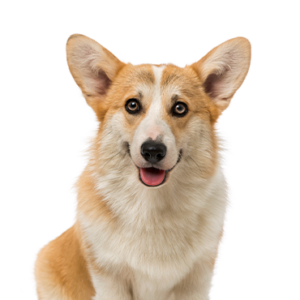Please create a free account below, or login by clicking here.
Petland Racine, Wisconsin

In medieval times, the kings of Europe advertised their majesty to their subjects and visiting emissaries by the richness of their possessions. Carpets, textiles, and tapestries were important factors in these displays of conspicuous consumption. The era’s best weavers were centered in Flanders, now northern Belgium. It was common for monarchs to stage talent raids to induce Flemish weavers to relocate to their kingdoms. So it was that in the year 1107, Henry I of Britain invited a community of these master craftsmen to live and work in the southwestern Wales. The weavers accepted Henry’s invitation and brought all they needed to re-create their agrarian way of life in their new homeland. This included the dogs they bred to herd cattle and sheep. These sturdy, short-legged herders were the foundation for the breed we now know as the Pembroke Welsh Corgi. The Pembroke has been a distinctly separate breed from his cousin the Cardigan Welsh Corgi since the late 1800s, but the two breeds often intermingled in the old Welsh breeding centers of Pembrokeshire and Cardiganshire. Today, the most noticeable differences between the breeds are the ears (the Pembroke’s are pointed and erect, the Cardi’s rounded) and the tail (the Cardi tale is much longer than the Pembroke’s). The world’s most famous Pembroke fan is Elizabeth II. The queen got her first Pembroke, Dookie, in 1933 and has not been without one or more since.
The Pembroke Welsh Corgi is a breed renowned for its loyal, intelligent, and affectionate personality traits. These charming dogs form strong bonds with their families, showcasing a deep sense of loyalty towards their loved ones. Known for their keen intelligence, Corgis are quick learners and excel in various dog sports and activities, responding well to training with enthusiasm. Their affectionate nature makes them excellent companions who love to be involved in all family affairs, whether it’s a cuddle on the couch or a spirited walk outdoors. These characteristics combined create a lively, loving, and smart canine friend that enriches the lives of those around them.
Corgi really like the members of their immediate family but by contrast will seem disinterested in strangers. Corgi also can sometimes be stubborn when they are asked to do something they do not want to do.
A strong, athletic little dog developed to herd cattle and other livestock, the Pembroke Welsh Corgi loves physical activity and is happiest when he has a job to do. Corgis benefit from moderate daily exercise to maintain their physical and mental health. Pembrokes can do well on long walks or slow jogs, but their short legs won’t allow them to keep up with a bicycle rider. Avoid extreme heat or cold, and always provide plenty of cool, fresh water after exercise. Many Pembrokes enjoy and excel at canine activities such as agility, herding, obedience, and tracking events.
The Pembroke has a thick, weatherproof double coat’a soft, light undercoat covered by a coarse outer coat. The breed sheds a fair amount on a daily basis, and even more so in the late spring/early summer. A daily once-over with a comb and a slicker brush will remove a lot of the shed hair before it is all over the house. During shedding season, baths help to loosen the dead hairs’the dog must be completely dry before brushing begins’and a rake helps strip out the undercoat. As with all breeds, the Corgi’s nails should be trimmed regularly, and ears checked to be sure they are clean and healthy.
As with all breeds, early socialization and puppy training classes are strongly recommended. Gently exposing the puppy to a wide variety of people, places, and situations between the ages of 7 weeks and 4 months will help him develop into a well-adjusted, well-mannered adult. Pembrokes often have a mind of their own, but they are energetic, willing, and highly intelligent partners who respond well to training. Positive, reward-based training works best with this sensitive breed.
The Pembroke Welsh Corgi should do well on a high-quality dog food, whether commercially manufactured or home-prepared with your veterinarian’s supervision and approval. Any diet should be appropriate to the dog’s age (puppy, adult, or senior). Some dogs are prone to getting overweight, so watch your dog’s calorie consumption and weight level. Treats can be an important aid in training, but giving too many can cause obesity. Learn about which human foods are safe for dogs, and which are not. Check with your vet if you have any concerns about your dog’s weight or diet. Clean, fresh water should be available at all times.
A Pembroke Welsh Corgi, although similar to a Cardigan Welsh Corgi can be differentiated from the Cardigan Welsh Corgi with its ears. While the Pembroke Welsh Corgi has pointy and circular ears, the Cardigan has longer ears. Standard Pembroke Welsh Corgi will also have a docked or bob-tail, Cardigan Welsh Corgi have a full, unaltered tail.
The Pembroke Welsh Corgi lives up to 13 years.
The Pembroke Welsh Corgi does shed. Brushing multiple times per week will help control how much loose hair you notice around your home.
The Pembroke Welsh Corgi is not Hypoallergenic.
The Pembroke Welsh Corgi weighs up to 30 pounds
As with all breeds, early socialization and puppy training classes are strongly recommended. Gently exposing the puppy to a wide variety of people, places, and situations between the ages of 7 weeks and 4 months will help him develop into a well-adjusted, well-mannered adult. Pembrokes often have a mind of their own, but they are energetic, willing, and highly intelligent partners who respond well to training. Positive, reward-based training works best with this sensitive breed.
Fill out the below form and we'll get back to you as soon as possible. Thanks!
"*" indicates required fields